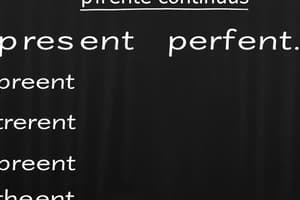Podcast
Questions and Answers
Which sentence demonstrates the correct formation of the present perfect continuous tense?
Which sentence demonstrates the correct formation of the present perfect continuous tense?
- She has been working at the company since five years.
- We have been experiencing technical difficulties. (correct)
- I has been prepare the presentation.
- They have been finish the report.
In a business context, when is it most appropriate to use the present perfect continuous tense?
In a business context, when is it most appropriate to use the present perfect continuous tense?
- To describe completed tasks with no present relevance.
- To describe actions starting in the past and continuing to the present, focusing on duration. (correct)
- To emphasize the result of a completed action.
- To report a single event that happened at an indefinite time in the past.
What is the primary difference in focus between the present perfect simple and the present perfect continuous tenses?
What is the primary difference in focus between the present perfect simple and the present perfect continuous tenses?
- Present Perfect Continuous is used for single events, and Present Perfect Simple is used for repeated actions.
- Present Perfect Simple is only used for actions completed in the distant past.
- Present Perfect Simple emphasizes the duration, while Present Perfect Continuous focuses on the result.
- Present Perfect Simple focuses on the completion of an action or the result, while Present Perfect Continuous emphasizes the duration or ongoing nature. (correct)
Which of the following sentences demonstrates the correct usage of present perfect continuous to explain the background of a situation?
Which of the following sentences demonstrates the correct usage of present perfect continuous to explain the background of a situation?
In which scenario is using the present perfect continuous most effective for preventing misunderstandings in professional communication?
In which scenario is using the present perfect continuous most effective for preventing misunderstandings in professional communication?
Which example best illustrates the use of present perfect continuous to describe an action that recently stopped but has a present result in a business setting?
Which example best illustrates the use of present perfect continuous to describe an action that recently stopped but has a present result in a business setting?
Which of these sentences emphasizes the process rather than the completion of a task?
Which of these sentences emphasizes the process rather than the completion of a task?
A project manager wants to inform the team that the development phase is still active and ongoing. Which sentence is most appropriate?
A project manager wants to inform the team that the development phase is still active and ongoing. Which sentence is most appropriate?
Select the sentence that demonstrates the correct use of the present perfect continuous in a business context.
Select the sentence that demonstrates the correct use of the present perfect continuous in a business context.
What is the key advantage of using the present perfect continuous when discussing ongoing negotiations in a professional setting?
What is the key advantage of using the present perfect continuous when discussing ongoing negotiations in a professional setting?
Flashcards
How do you form Present Perfect Continuous?
How do you form Present Perfect Continuous?
“Has/Have been” + present participle (verb ending in -ing)
When to use Present Perfect Continuous?
When to use Present Perfect Continuous?
To describe actions started in the past and continuing now, focusing on duration. Emphasizes the ongoing process rather than completion. Can also describe recently stopped actions with present results.
Present Perfect Simple focuses on what?
Present Perfect Simple focuses on what?
Focuses on the completion of an action or the result.
Present Perfect Continuous emphasizes what?
Present Perfect Continuous emphasizes what?
Signup and view all the flashcards
Why is Present Perfect Continuous important in communication?
Why is Present Perfect Continuous important in communication?
Signup and view all the flashcards
"We have been experiencing technical difficulties" implies?
"We have been experiencing technical difficulties" implies?
Signup and view all the flashcards
"She has been leading the negotiations" suggests?
"She has been leading the negotiations" suggests?
Signup and view all the flashcards
"I have been preparing the presentation all morning" shows?
"I have been preparing the presentation all morning" shows?
Signup and view all the flashcards
"They have been implementing the new software" means?
"They have been implementing the new software" means?
Signup and view all the flashcards
"The market has been showing positive signs lately" implies?
"The market has been showing positive signs lately" implies?
Signup and view all the flashcards
Study Notes
- Present perfect continuous is a B1 English grammar topic relevant for business contexts.
- It's important to understand for effective professional communication.
Forming Present Perfect Continuous
- Use "has/have been" + the present participle (verb ending in -ing).
- Example: "The team has been working on the project."
Usage in Business Contexts
- To describe longer actions that started in the past and continue into the present, focusing on the duration.
- To emphasize the process, activity, or duration of an action rather than its completion.
- To express actions that have recently stopped but have a present result.
Differences From Present Perfect
- Present perfect simple focuses on the completion of an action or the result.
- Present perfect continuous emphasizes the duration or ongoing nature of the action.
Implications in Professional Communication
- Using present perfect continuous correctly can convey nuances related to ongoing projects, continuous efforts, or recent activities with current relevance.
- Helps to explain the background or context of a situation by referring to how long something has been happening.
- Prevents misunderstandings by clearly indicating whether an action is completed or still in progress.
Common Business-related Examples
- "We have been experiencing technical difficulties."
- "She has been leading the negotiations."
- "I have been preparing the presentation all morning."
- "They have been implementing the new software."
- "The market has been showing positive signs lately."
Studying That Suits You
Use AI to generate personalized quizzes and flashcards to suit your learning preferences.




